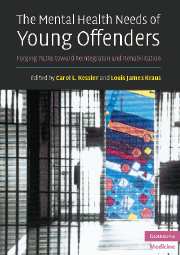Book contents
- Frontmatter
- Contents
- List of contributors
- Foreword
- Acknowledgments
- 1 An overview of child and adolescent mental health needs in the juvenile justice system
- 2 Psychiatric disorders of youth in detention
- 3 Disproportionate minority confinement
- 4 Police interrogation of youth
- 5 Assessing children's competence to stand trial and to waive Miranda rights: new directions for legal and medical decision-making in juvenile courts
- 6 The etiology of antisocial behavior: biopsychosocial risk factors across development
- 7 Substance abuse in youth offenders
- 8 Suicide and delinquent adolescents
- 9 Juvenile sex offenders
- 10 Educational needs of youth in the juvenile justice system
- 11 Science and the juvenile death penalty
- 12 Medical issues regarding incarcerated adolescents
- 13 Mental health screening and assessment in juvenile justice
- 14 Psychological testing in juvenile justice settings
- 15 Psychopharmacology and juvenile delinquency
- 16 Evidence-based treatment for justice-involved youth
- 17 Community alternatives to incarceration
- 18 Innovative problem-solving court models for justice-involved youth
- 19 Ethical issues of youthful offenders: confidentiality; right to receive and to refuse treatment; seclusion and restraint
- 20 Post-adjudicatory assessment of youth
- Index
- References
4 - Police interrogation of youth
Published online by Cambridge University Press: 11 August 2009
- Frontmatter
- Contents
- List of contributors
- Foreword
- Acknowledgments
- 1 An overview of child and adolescent mental health needs in the juvenile justice system
- 2 Psychiatric disorders of youth in detention
- 3 Disproportionate minority confinement
- 4 Police interrogation of youth
- 5 Assessing children's competence to stand trial and to waive Miranda rights: new directions for legal and medical decision-making in juvenile courts
- 6 The etiology of antisocial behavior: biopsychosocial risk factors across development
- 7 Substance abuse in youth offenders
- 8 Suicide and delinquent adolescents
- 9 Juvenile sex offenders
- 10 Educational needs of youth in the juvenile justice system
- 11 Science and the juvenile death penalty
- 12 Medical issues regarding incarcerated adolescents
- 13 Mental health screening and assessment in juvenile justice
- 14 Psychological testing in juvenile justice settings
- 15 Psychopharmacology and juvenile delinquency
- 16 Evidence-based treatment for justice-involved youth
- 17 Community alternatives to incarceration
- 18 Innovative problem-solving court models for justice-involved youth
- 19 Ethical issues of youthful offenders: confidentiality; right to receive and to refuse treatment; seclusion and restraint
- 20 Post-adjudicatory assessment of youth
- Index
- References
Summary
In legal parlance, “double jeopardy” refers to being held responsible twice for substantially the same crime. The Fifth Amendment of the US Constitution disallows this, essentially holding that the state only gets one bite at the apple. The term “double jeopardy” has also been used to describe several situations in which two characteristics or two circumstances place people at risk in the legal system, perhaps because of the double entendre. For example, Professor Thomas Grisso (2004) recently published a book, entitled Double Jeopardy: Adolescent Offenders with Mental Illness, citing that the combination of young age and the presence of mental health problems among justice-involved youth pose special problems for treatment in custodial settings, due process, and public safety. Similarly, a recent report to Congress was entitled Double Jeopardy: Persons with Mental Illness in the Criminal Justice System (CMHS, 1995), examining the double-sided problem of the reactions of people with mental illness to the criminal justice system and the reactions of the system to this population.
In the present chapter, our focus is on two vulnerability characteristics – young age and mental health – that can place people in jeopardy in the interrogation room. The jeopardy that exists, and for which there are not suitable safeguards, is the risk of police eliciting false and coerced confessions. Moreover, once confessions or other guilty-knowledge statements are made, the risk of further miscarriages of justice, such as wrongful incarcerations and wrongful convictions, increases substantially.
- Type
- Chapter
- Information
- The Mental Health Needs of Young OffendersForging Paths toward Reintegration and Rehabilitation, pp. 61 - 78Publisher: Cambridge University PressPrint publication year: 2007
References
- 5
- Cited by

